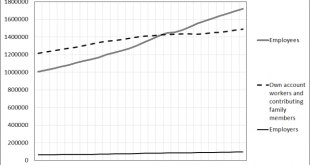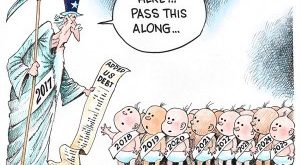United States Source: An Economics Sense United Kingdom Source : UK Office for National Statistics France France and United States VOX-FI
Read More »Putting the baby in the tub: unemployment in a neoclassical (?) macro model
Is it possible to model unemployment in neoclassical ‘DSGE’ macro-economic models ? I’m occupied with a project which compares neoclassical macro concepts with statistical macro concepts. One of the glaring differences between the statistics and the models: we measure unemployment as a matter of routine but DSGE-models do not conceptualize or define, let alone operationalize it. When you model our society as a one person ‘Robinson Crusoë’ ‘society’ you will have somebody who works a...
Read More »Open thread April 23, 2019
Is public debt — really — a burden on future generations?
from Lars Syll The real issue … is not whether it is possible to shift a burden (either in the present or in the future) from some people to other people, but whether it is possible by internal borrowing to shift a real burden from the present generation, in the sense of the present economy as a whole, onto a future generation, in the sense of the future economy as a whole … The latter is impossible because a project that uses up resources needs the resources at the time that it uses them...
Read More »Veblen’s insights come back to haunt us.
from Ken Zimmerman Veblen’s “The Theory of the Leisure Class” is even more relevant for events over the last 100 years. But this and most other Veblen research and writing have been systematically buried. Thorstein Veblen’s working life — from 1890 to 1923 — overlapped with America’s first Gilded Age, so named by Mark Twain, whose novel of that title lampooned the greedy corruption of the country’s most leisurely gentlemen (all men). Now, well into America’s second (bigger and better)...
Read More »“Concepts of Structural Change: Mainstream, Heterodox and Marxist conceptions and the Greek crisis’ – S.Mavroudeas 24-4-2019 Universidad Computense de Madrid
Noticias – Máster Universitario en Economía Internacional y Desarrollo Seminario de investigación, miércoles 24 de abril 19 ABR 2019 – 12:49 CET Lla próxima sesión del seminario de investigación del Máster en Economía Internacional y Desarrollo tendrá lugar el miércoles 24 de abril. En ella, Stavros Mavroudeas, profesor de Economía Política en el Departamento de Política Social de la Universidad Panteion de Atenas, expondrá el trabajo titulado «Concepts of Structural Change:...
Read More »The Great Transformation: poverty on a large scale
from Maria Alejandra Madi In the analysis of the economic and social transformations of the nineteenth century, Polanyi noted that the emergence of a market economy pushed to the side the old economic and social systems based on reciprocity and redistribution. Since then, the market economy has been characterized as an economic system controlled by prices that determine what, how and how much is produced and how is distributed. As Polanyi explained, the decisions about production and...
Read More »Open thread April 19, 2019
Share of wealth held by the bottom 90% by country
Sources: Credit Suisse (aggregating data from national records) Last updated: May 12, 2016
Read More »“This was it seems Nordhaus’ plan all along.”
from Ken Zimmerman Bichler and Nitzan get into the details of how “capitalization” is used to deny climate change in their article, ”How to use capitalization to minimize the cost of climate change and win a Nobel for ‘sustainable growth.’” The title says it all. William D. Nordhaus won the Nobel prize in economics for a climate model that minimized the cost of rising global temperatures and undermined the need for urgent action. Nordhaus’ “racket” created low-ball estimates of the costs...
Read More » Heterodox
Heterodox





